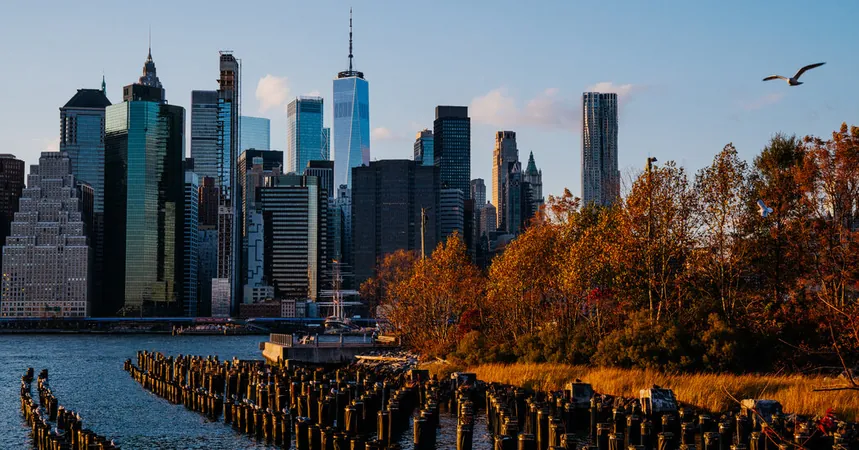
Trump's Controversial Comments Lead to a Canadian Tourist Exodus from New York
2025-03-19
Author: Yan
Overview
In what could be a significant blow to New York City's economy, many Canadians are now rethinking trips south of the border, particularly to popular destinations like New York City. Reports indicate that over one million Canadians contributed hundreds of millions to the city’s economy last year, but trip cancellations are rising sharply as tensions escalate between the U.S. and Canada.
Impact on Groups of Travelers
Educational institutions, along with different groups of travelers—including retirees and newlyweds—are opting out of their planned visits. A notable impact is seen in cancellations from numerous high school groups and other traveling entities, all of which cite President Trump's provocative remarks and threats to annex Canada as influencing their decisions.
Economic Consequences
"Tourists are staying away in droves," said Matt Levy, owner of the New York City tour guide company Spread Love Tours, which predicts a 50% drop in Canadian clientele this year. The economic repercussions of this trend could echo far beyond the city limits, affecting surrounding regions that heavily rely on Canadian tourism. In 2023 alone, nearly four million Canadians visited New York State, spending an astounding $1.7 billion.
Local Tour Operators
Local tour operators, like Travac Tours from Ottawa, report an alarming halt in bookings. "Our customers, primarily retirees who splash out on experiences, have paused their travel entirely," lamented manager Cindy Tobin, highlighting an increasing sentiment among Canadians to boycott American financial engagements out of protest against the U.S. government's actions.
Political Tensions
Trump's recent imposition of tariffs and questionable assertions regarding Canada being merely an "artificial line" have further strained relations. Former Prime Minister Justin Trudeau has responded by urging Canadians to prioritize domestic travel instead, trying to rally national pride amidst international tension.
Statistics and Trends
Despite experiencing a surge of Canadian visitors last year, the latest statistics painted a grim picture: airport data suggests an 11% decline in Canadian arrivals in New York City recently. Vehicle traffic across the borders also plummeted, with reports of a 14% drop in crossings.
Social Dynamics
Social dynamics within the city have shifted as well. Places that usually buzz with Canadian patrons, like the Ontario Bar in Brooklyn, have noticed a marked absence—evidenced by fewer inquiries for Canadian products. "We miss our Canadian customers," remarked co-owner Andrew Benedict.
Personal Stories
Individuals like Ben Renaud, who had planned two trips to celebrate family milestones, push back travel plans to reconsider alternatives. “We wanted to experience New York together, but it feels unsafe and unwelcoming now,” he said, reimagining vacations closer to home or perhaps across the ocean to Europe.
Long-term Projections
The impact of this ongoing boycott is projected to seep into the fabric of tourism for years to come. The once-thriving bus tours that brought numerous Canadians into New York for quick escapes have nearly vanished, with some companies reporting bookings reduced to nearly zero.
Fears for the Future
As tensions continue to escalate, tourism officials, especially in border towns in western New York, are alarmed. Up to 20% of visitors to cities like Rochester come from Canada, making any noticeable downturn in Canadian travel threaten these local economies profoundly.
Conclusion and Outlook
"Regardless of future tariff resolutions, the loss of trust and goodwill could last a lot longer," warned Matthew Elliott, a local parent whose travel plans were canceled due to the boycott. "It will no doubt hurt numerous business owners along the way, affecting all of us." As New York City faces the dual challenges of a declining Canadian tourist influx and the lingering impacts of the COVID-19 pandemic, it is a critical moment for local businesses and tourism stakeholders. Can relationships be mended, or will this ongoing rift redefine cross-border tourism permanently? Only time will tell.


 Brasil (PT)
Brasil (PT)
 Canada (EN)
Canada (EN)
 Chile (ES)
Chile (ES)
 Česko (CS)
Česko (CS)
 대한민국 (KO)
대한민국 (KO)
 España (ES)
España (ES)
 France (FR)
France (FR)
 Hong Kong (EN)
Hong Kong (EN)
 Italia (IT)
Italia (IT)
 日本 (JA)
日本 (JA)
 Magyarország (HU)
Magyarország (HU)
 Norge (NO)
Norge (NO)
 Polska (PL)
Polska (PL)
 Schweiz (DE)
Schweiz (DE)
 Singapore (EN)
Singapore (EN)
 Sverige (SV)
Sverige (SV)
 Suomi (FI)
Suomi (FI)
 Türkiye (TR)
Türkiye (TR)
 الإمارات العربية المتحدة (AR)
الإمارات العربية المتحدة (AR)